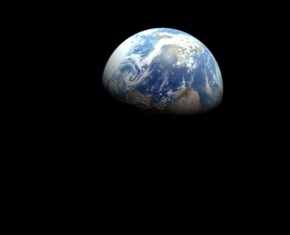The views expressed in our content reflect individual perspectives and do not represent the authoritative views of the Baha'i Faith.
You may have noticed, if you’ve hung around Baha’is long enough, that they often say prayers from a Baha’i prayer book. Why do they do that? Why don’t they use their own words when they pray?
The answer is, we do! But Baha’is also say prayers that were written down over a hundred years ago by the central figures of their Faith, prayers later translated into hundreds of languages, like the Lord’s prayer of the Bible.
You may also have noticed that the prayers sound perhaps a bit strange and yet somehow familiar. In Baha’i prayers you’ll hear words from old English, like “Thee,” “Thou,” and “seeketh.” You’ll hear phrases like “Thy will and Thy good pleasure” and “We are servants of Thine sheltered beneath Thy providence.”
RELATED: Polishing the Soul with Daily Prayer
That sort of formal usage – a common convention and a mark of respect in translations of holy scripture – employs old English even outside the Judeo-Christian framework. Using the capitalized pronouns “He,” “His,” and “Him” to refer to the Creator, even though God’s essence transcends gender, is also a long-held convention when translating scripture into English.
In Baha’i prayers, you will also notice the generous use of metaphors to describe spiritual realities. You’ll hear poetic phrases like “By the breezes of Thine eternity gladden me, O Thou Who art my God!” and “Let Thine everlasting melodies breathe tranquility on me, O my Companion.” You’ll also hear, “I am Thy servant and in Thy hands,” even though Baha’is know that God doesn’t literally have hands, these metaphors help our souls get in touch with spiritual, metaphorical, and mystical realities.
The Baha’i prayers may also strike you as different, because they reveal a loving, kind, compassionate, forgiving, generous, all-knowing, transcendent, holy, all-powerful, mighty Creator – all these attributes and many more.
Baha’is and others regard these prayers as gifts to be treasured. Despite severe persecution, torture, imprisonment, and banishment, the central figures of the Baha’i Faith – Baha’u’llah, the Bab and Abdu’l-Baha – revealed these prayers between 1844 and 1921 for our use, in fact for the benefit of all humankind. They sacrificed their lives for our salvation, that is, for our social and spiritual education, health and well-being, and for the unity, peace, and security of the whole world.
Personally, I’ve said these prayers for nearly 60 years, and all I can say is, they are collectively my greatest teacher, my most trusted companion on the spiritual path. Of course, I also say prayers using my own words: “God help me, I’m drowning here!” or “Assist me to get out of my own way!” But honestly, I prefer the Baha’i prayers, and I’ve made them my own, embedded in the deepest part of my heart and soul.
Which brings me to these questions: Why do so many people pray to an invisible Being, mysterious to us all? What inspires us to do so? How do we know this Supreme Being actually exists? Who is it that we actually pray to?
As a Baha’i I’ve always believed that science and religion ideally go hand-in-hand, and should agree when based in reality. This conviction has led me to believe that, considering the marvelous order of our incomprehensively huge universe, it takes a greater leap of faith to believe that nothing created the universe than to believe in an all-powerful Creator. That’s hugely ironic, in my view. Some would disagree, but surely there is a Cause to the Effect of the universe. As Albert Einstein once said: “When I see a piece of toast, I know that somewhere there’s a toaster.”
Knowing there’s a Supreme Being that deliberately set our universe in motion carries with it many crucial implications, so let’s consider a few of them.
For one, He is the Creator of all humankind. God created 1) our bodies through the process of evolution, which is an expression of God’s creativity, and 2) our spirits through divine Providence. Wouldn’t it then follow that He desires for us all to get along together regardless of race, creed, etc. – and even show true affection and love for one another? After all, the core teaching of the Baha’i Faith declares that we are all members of one human family.
Surely God prefers that we be in touch with reality when we turn in prayer to Him. If we’re out of touch with reality, then the odds of making an authentic connection with the Creator are low. Perhaps the most important truth or reality we face is the fact that we are tiny beings compared to the almighty Creator of the universe. We are mere brush-strokes of the Supreme Artist! We may be like a beautiful painting, but can a painting comprehend the mind of the artist that painted it?
That’s why all the Baha’i prayers are full of praises in honor of that mysterious and exalted Being, and why many Baha’i prayers end like this: “…Thou art the Healer, the Preserver, the Helper, the Almighty, the Powerful, the All-Glorious, the All-Knowing.”
If we want to benefit fully from these prayers, we need to pay serious attention to God’s will and good-pleasure and learn the lessons He has, with infinite grace, sent down to us.
Comparatively, imagine that you are a student studying physics in the 1930s, and suddenly, in through the classroom door walks Albert Einstein, the day’s guest lecturer. What an opportunity! You wouldn’t want to squander it. If the class erupts in laughter when they see Einstein’s unkempt hair and fails to pay attention, those students are only hurting themselves. You and I hopefully would listen very, very carefully, and learn all we could.
RELATED: How to Overcome 9 Hindrances to Prayer
Finally, the Baha’i prayers teach us that the highest station we humans can attain is complete servitude to our Creator. Now at first glance, this runs counter to our baser instincts. No one wants to be a slave to anyone or anything. We have our own agency, free will, and self-determination. No one wants to give that up, and the Baha’i teachings say we shouldn’t.
To explain this seeming contradiction, let’s return to Einstein’s toaster so we can better understand the Baha’i prayers. What good is a toaster if it’s not plugged in to an electrical current? It wouldn’t make a very good anchor, or knick-knack, or flower pot. Its purpose is to make toast from bread, so it only works when it’s plugged into power.
Baha’is would say that the human spirit operates under the same principle – it achieves its true purpose and potential when it’s plugged into spiritual power. When it’s not plugged in, it languishes and atrophies.
Every prayer revealed by the central figures of the Baha’i Faith calls us to that higher place and encourages our humility before the Creator. Einstein’s toaster, if it had the capacity to desire or feel a sense of longing, would yearn to be plugged into power to fulfill its purpose – and it would be grateful, would love, even worship the source of power that gives it life. Without that power, it is nothing.
In the same way, when our spirit plugs into God’s will and good-pleasure, it flourishes. When I’m thinking more about God’s wishes than my own, or when I succeed in actually making God’s wish my own, then I’m plugged into a higher and more powerful circuit, like Einstein’s toaster, and I’m fully functional in the spiritual sense. When I’m not plugged in, I’m as one dead by comparison.
When a Baha’i prayer says, “Thou seest me … rid of all attachment to anyone save Thee,” those words don’t mean that we shouldn’t forge bonds of love and friendship with others. Instead, they refer to that spiritual state of being which, once achieved, makes us better able to love and cherish others, and to act in the light of God’s love, fairness, and justice.
A Baha’i evening prayer says, “I beg of Thee, O my Lord, by Thine eye that sleepeth not, to guard mine eyes from beholding aught beside Thee.” Obviously the prayer refers to our inner eyes, or our spiritual perceptions, otherwise we could bump into a tree, or fall off a cliff.
Here’s a portion of another beautiful prayer from Baha’u’llah: “… I have turned to Thee, forsaking mine own will and desire, that Thy holy will and pleasure may rule within me … This servant, O Lord, though helpless turneth to the Orb of Thy Power …”
Of course it takes trust and faith to give ourselves over to an invisible Creator, and that is a huge challenge in today’s world. To meet that challenge, try using those wonderful Baha’i prayers each day, and feel their profound impact on your soul.
















Comments
Sign in or create an account
Continue with Googleor